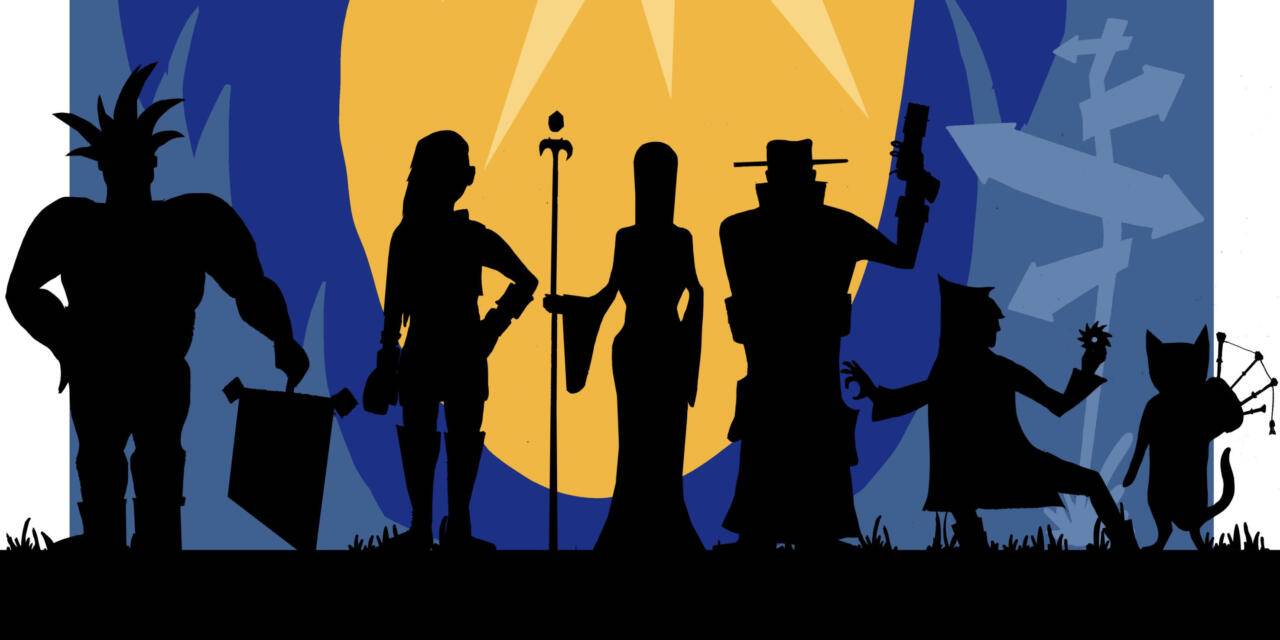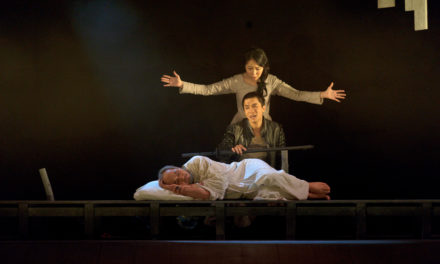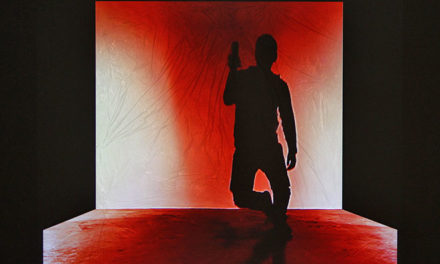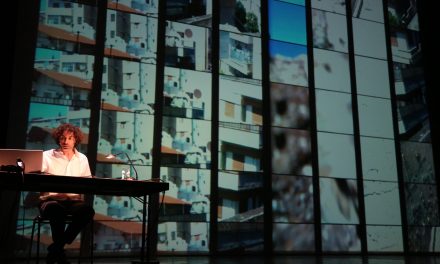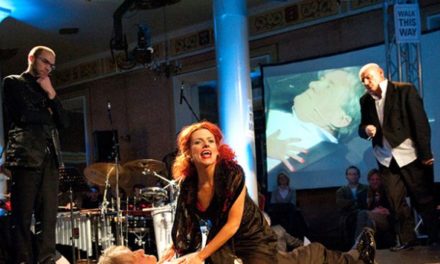For lovers of the fantastical and the geeky, the scene at Under St. Mark’s is one of nostalgia and familiarity. The pre-show music is reminiscent of Undertale; the font demarcating several key set pieces—“Inventory,” “Tools,” “Spells”—is that of the NES’s late ‘80s Final Fantasy menu. Even the descent to the show’s space is atmospheric: walking down semi-rickety steps, arriving in a darkened space made primarily of wooden structures, one feels as if arriving at a clandestine meeting of adventurers. It’s welcoming and gets the heart going all at once.
My companion and I are here to watch Andrew Agress’s The Fantastical Fellowship: Final Quest for the Crisis Crystal XXVII. It is, as rightly sold by the press pitch, an interactive fantasy spoof, wherein the audience is offered chances to aid the Chosen One in her quest to Save The World…that is, until she fails, and we must help her ragtag group of sidekicks to succeed in her stead.
Agress is a fan of fantasy media himself, a fact that shows with immediacy. The Narrator is reminiscent of a Dungeon Master (for those unfamiliar, a DM is essentially the leader of a game of Dungeons and Dragons). The carrying on of a photo of Sean Bean, acting as silent compatriot, prompts immediate chuckles: the “Sean Bean Curse” is inevitable, and, sure enough, that character dies off quickly. Throughout the 90-minute show, these niche jokes keep coming: a Scottish demon-cat who quotes Braveheart and sings “(I’m Gonna Be) 500 Miles,” a baddie named after Sepheroth who sprouts dysfunctional wings, a reverse minotaur in the midst of a darkened labyrinth. They are rather cleverly designed so as to appeal to the subjects’ fanbase without alienating those who came in lacking prior knowledge. That said, the show is most enjoyable when one does have the humor’s references: having seen Lord of the Rings or played Final Fantasy will be extremely helpful for audience members in comprehension. I, a self-proclaimed fantasy geek, am certain I missed out on several laughs due to simple ignorance.
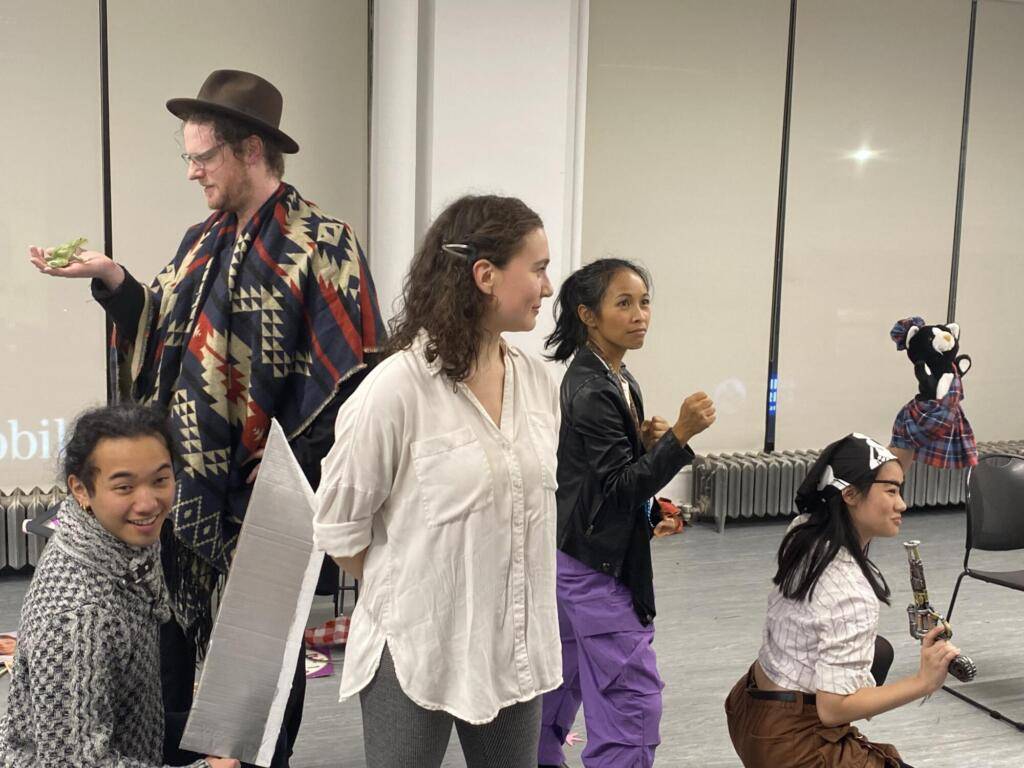
L to R: Patrick Elizalde, Theo McKenna, Stephanie Litchfield, Mary Rose Go, and Rebecca Ho in rehearsal. PC: Greg T. Nanni.
The Fantastical Fellowship’s interactive feature lends itself well to filling in the joy gaps. Throughout, the engagement of actor and audience is very low-pressure, rather low-stakes, reading more like a casual improv show than full immersion. This walks the line skillfully, both for folks who love to participate and folks who shrink from speaking up. The show’s interaction begins when the audience walks through the door. Greeted by Agress, they are invited to craft fire and ice spells for the cast to utilize; these are placed in the Chosen One’s Spellbook before the show begins. When the Chosen One arrives, the audience discovers that they are her “ancestral sprits:” she can speak to them via a mystical jewel around her neck, leading them to help her select tasks, tools, and routes as she progresses, either by hand raise or vocalization.
The cast performs this artistic mishmash very successfully. Of great standout are Theo McKenna and Rebecca Ho, embodying a variety of characters with nearly-nonexistent turnaround time. McKenna gives us narrator, antagonist, and mentor in equally brilliant measure; Ho is a study in vocal creation, crafting a different world with each characterization she undertakes. I was in awe of them both at each switch. Stephanie Litchfield, Patrick Elizalde, and Mary Rose Go round out the adventurous cohort with humor skill aplenty, directed by Phoebe Brooks. This was certainly the right team to take on such a play.
Overall, The Fantastical Fellowship: Final Quest for the Crisis Crystal XXVII provides a jolly time for one’s night. It’s certainly not a masterpiece in the classical sense, but I couldn’t stop smiling: the escapism of laughter is always something beautiful.
The Fantastical Fellowship runs through February 9, 2024. For more information, click here.
This post was written by the author in their personal capacity.The opinions expressed in this article are the author’s own and do not reflect the view of The Theatre Times, their staff or collaborators.
This post was written by Rhiannon Ling.
The views expressed here belong to the author and do not necessarily reflect our views and opinions.

